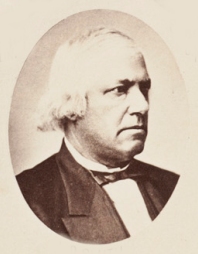Joshua Bowen Smith facts for kids
Joshua Bowen Smith (born 1813, died 1879) was an important person who fought against slavery. He helped enslaved people escape to freedom through the Underground Railroad. He also helped start the New England Freedom Association. Later in his life, he became a politician, serving in the Massachusetts state government. He owned a successful catering business in Boston.
Contents
Early Life and Catering Career
Joshua Bowen Smith was born in 1813 in Coatesville, Pennsylvania. His mother was of mixed African-American and Native American background, and his father was British. He grew up in Philadelphia, where he received an education thanks to a scholarship from a kind Quaker person.
In 1836, when he was a young man, Smith moved to Boston. He started working as a headwaiter at the Mount Washington House hotel. There, he met important people like United States Senator Charles Sumner. He also became friends with John J. Fatal, who was another strong supporter of ending slavery.
Smith worked for a catering business for several years. A caterer is someone who provides food and drinks for events, like parties or dinners. When he was 36, Smith decided to start his own catering company.
For the next 25 years, Smith's business did very well. He catered big events, including graduation dinners for Harvard College. He also provided food for city events and even for the Union army during the Civil War. Through his work, he met many other people who wanted to end slavery, such as William Lloyd Garrison and Robert Gould Shaw.
Fighting Against Slavery
Joshua Bowen Smith was deeply involved in the Underground Railroad. This was a secret network of safe houses and routes that helped enslaved people escape to freedom. He was also a member of the Boston Vigilance Committee. This group worked to help enslaved people who had escaped.
Smith often hid people escaping slavery in his home in Cambridge. He also gave them jobs in his catering business as cooks and waiters. He would often give them his own money, and sometimes even weapons or supplies. This helped them on their journey, especially if they were traveling all the way to Canada to be truly free.
He helped create the New England Freedom Association. This group was started by African Americans to help people who had escaped slavery. Smith was a Baptist and believed that the Fugitive Slave Act of 1850 was wrong. This law said that escaped enslaved people had to be returned to their owners. Smith felt it was "un-Christian." He even believed that using force to defend against slavery was right. He once showed a dagger and a revolver during a speech to show how strongly he felt about fighting for freedom.
Later Life and Public Service
In 1861, Smith's catering business faced a big problem. The Governor of Massachusetts, John Albion Andrew, refused to pay him for services he provided to the 12th Massachusetts Regiment. The governor said he couldn't pay because the state government hadn't approved the money. However, he paid other caterers who were owed money. Smith sued the state in 1879 and received some money, but it wasn't enough to cover his legal costs. He spent the rest of his life dealing with debt.
In 1865, Smith played a key role in getting state officials to create a memorial for Robert Gould Shaw. Colonel Shaw led the African-American 54th Massachusetts Regiment, which fought bravely in the Civil War. Smith worked with Governor Andrew and Senator Charles Sumner to make this happen.
The state hired a famous artist named Augustus Saint-Gaudens to create the memorial. He made a bronze sculpture showing Colonel Shaw and members of the 54th Massachusetts Regiment marching through Boston. The memorial was officially revealed on May 31, 1897.
In 1867, Smith became the first African-American member of the Saint Andrew's Lodge of Freemasons in Massachusetts. He also served as a junior warden in another lodge. From 1873 to 1874, he represented Cambridge in the Massachusetts state government for one term. He was the head of the Committee on Foreign Relations. He also helped Senator Charles Sumner write the Civil Rights Act of 1875. This law aimed to give equal rights to all citizens.
When Senator Sumner passed away, he left Smith a painting called The Miracle of the Slave. It was likely a copy of a famous painting by the Italian artist Tintoretto.
Joshua Bowen Smith passed away in Boston on July 5, 1879, after being sick for a long time. He was buried at Mount Auburn Cemetery in Cambridge.
Legacy and Honors
Joshua Bowen Smith's former home at 79 Norfolk Street in Cambridge has a special plaque. It was put there in 1994 by the Cambridge African American History Project. Smith bought the house in 1852 and lived there with his wife, Emeline, until he died.
See also
- 1873 Massachusetts legislature
- 1874 Massachusetts legislature
 | Roy Wilkins |
 | John Lewis |
 | Linda Carol Brown |


